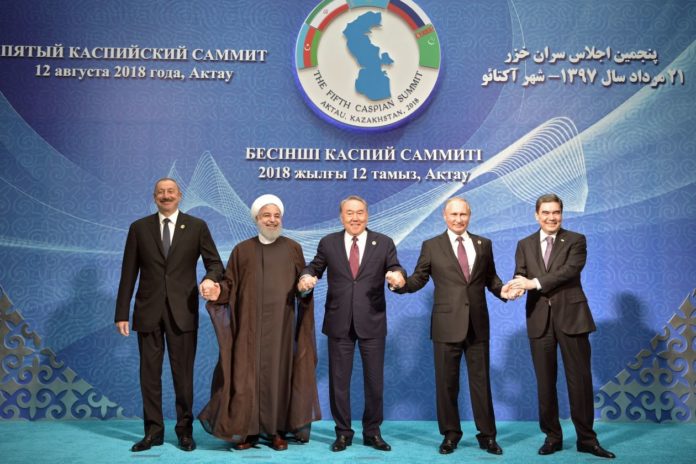The economics of Caspian Region (CR) has now been changed due to the recently held 5th Summit of the heads of the Caspian states in Aktau, Kazakhstan. Politics and geo-politics of Caspian Region has also been rewritten and redrafted because of the signing of the Convention on the Legal Status of the Caspian Sea (CLCS).
Regional Security & Greater Socio-Economic Integration
Elements of regional security, greater socio-economic integration, logistic connectivity, energy security, optimal utilization of available natural resources and the last but not the least, better political understanding have been enhanced because of the historic agreement on Caspian Legal Status (CLS). It is the giant leap for regionalism and productivity and the right step in right direction for regional security and stability. It is a gigantic achievement which has multiplier dividends. Simply, it is a paradigm shift in all aspects of sustainable development.
Diversification of Regional Cooperation
The legal status of the Caspian sea enhances cooperation in the spheres of economy, transport, ecology and biological resources in e Caspian basin. It highlights concept of “collective security” in the region and at global scale. It is a historic agreement which has been finalized after 25 years. It has also set a long-lasting dispute to rest on Whether the Caspian is a sea or a lake which means it falls under different international laws. It refers to the Caspian as a sea and grants a “special legal status”. The agreement also offers hope for the Caspian’s ecological diversity and its depleted stocks of the beluga sturgeon, whose eggs are prized globally as caviar.
The 5th summit of the heads of the Caspian states was held in Aktau, Kazakhstan during which wide range of important matters were tabled and discussed. Management of the bio-resources of the Caspian Sea within the framework of the Commission for Protection, efficient and joint use of aquatic biological resources, improvement of ecological system and contribution to ecological development of Caspian Sea were also discussed.
The legal status of the Caspian Sea and cooperation in economy and transportation and cooperation to protect the ecology and bio resources were also discussed. The summit was the fifth of its kind since 2002 but there have been more than 50 lower-level meetings since the Soviet breakup spawned four new countries on the shores of the Caspian.
Landmark Agreement
Russia, Iran, Azerbaijan, Kazakhstan and Turkmenistan have reached a landmark agreement on the division of the Caspian Sea and put an end to the dispute over the legal status of the body water that started with the collapse of the Soviet Union. Under the Convention on the Legal Status of the Caspian Sea (CLCS), the Caspian Sea is neither a lake nor a sea, despite its name. The agreement establishes a formula for dividing up its fishing and seabed resources, including oil and gas.
Historic Perspectives
Right from the beginning of the 19th century, the Eurasian body of water provided a connectivity corridor between Asia and Europe over a wealth of oil and gas was exclusive Persian property. Russia then took over the northern margin. Until 1991, the Caspian had only two littoral states the Soviet Union and Iran which treated the Caspian as a border lake, with their 1921 Treaty of Friendship focusing largely on navigation rights and referencing natural resources only in regards to fishing. With the Soviet Union’s collapse as well as the discovery of valuable resources in the basin, the interests of the littoral states diversified.
Rule of the Game
After the breakup of the USSR, the Caspian ended up being shared by five states – Russia, Iran, Azerbaijan, Turkmenistan and Kazakhstan. Slowly but surely, the five states reached difficult com promises on sovereign and exclusive rights, freedom of navigation, freedom of access of all the vessels from the Caspian Sea to the world’s oceans.
Salient Features
The agreement will determine how gas and oil pipelines will be built, how environmental issues will be managed and how its various ecosystems will be protected. All the participating countries also established that no other regional or world power will be allowed to establish a military presence in the area i.e., Caspian Sea.
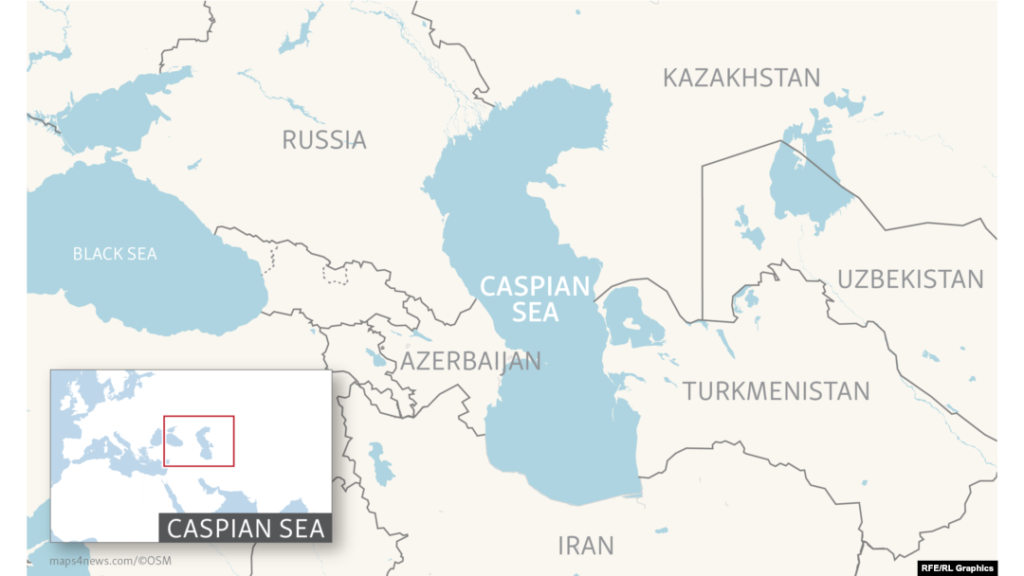
Shared Area
Now most of the Caspian Sea is a shared area; however, the seabed and natural resources are divided between the five countries. The sea will benefit from a special status with free access from all the coasts, going beyond the concept of territorial waters. A key factor is the delimitation of seabed boundaries whose precise definition must be the subject of further negotiations in bilateral rather than multi lateral discussions.
Caspian Offshore Hydrocarbon Reserves
According to International Energy figures, Caspian offshore hydrocar bon reserves are around 50 billion barrels of oil equivalent (equivalent to one third of Iraq’s total oil reserves) and 8.4 trillion cubic meters of gas (almost equivalent to the U.S.’ entire proven gas reserves). The hydrocarbon resources under the seabed are immense, estimated to be worth trillions of dollars. With proven reserves of 50 billion barrels of oil puts the region ahead of the United States or Nigeria. In addition, there are natural gas fields reckoned to be equivalent in size to those of Saudi Arabia.
Turkmenistan: Trans Caspian Pipeline
The agreement will also allow Turkmenistan to build the Trans Caspian pipeline, connecting Turkmenistan ‘s resources to the Azeri-Turkish joint project TANAP, and onwards to Europe this could easily become a counter-balance factor to the growing LNG business in Europe.
Iran
Iran seems to have gained much less than its neighbors as it has shortest border on the Caspian. From an energy perspective, Iran would be a natural market for the Caspian basin’s oil and gas, as Iran’s major cities (Tehran, Tabriz, and Mashhad) are closer to the Caspian than they are to Iran’s major oil and gas fields. Purchasing energy from the Caspian would also allow Iran to export more of its own oil and gas, making the country a transit route from the Caspian basin to world markets. Iran could earn fees for swap arrangements or for providing a transit route and justify its trade with Turkey and Turkmenistan as the swap deal is allowed under the Iran Libya Sanctions Act (ILSA, or the D’Amato Act).
Russian Energy Companies
Russian energy companies can explore the Caspian’s 50 billion barrels of oil and its 8.4 trillion cubic meters of natural gas reserves, Turkmenistan can finally start considering linking its gas to the Turkish-Azeri joint project TANAP through a trans-Caspian pipeline, while Iran has gained increased energy supplies for its largest cities in the north of the country (Tehran, Tabriz, and Mashhad) however, Iran has also put itself under the shadow of Russian ships.
Development of Offshore Oil & Gasoline Reserves
The five Caspian Sea nations have already developed offshore oil and gasoline reserves which are positioned close to sufficient to the coast to not be disputed. Projects within the northernmost waters Kazakhstan’s big Kashagan area and Russia’s Filanovsky and Korchagin deposit are seen as sources of future oil-output development for the international locations.
Surface Water
The surface water will be in common usage and all littoral states will have access beyond their territorial waters. It is an innovative compromise between all the main stake holder nations. The surface water is to be treated as an international sea which means freedom of navigation for the five peripheral countries to any of the shores. But the seabed is defined as if it were dry land, allowing for the distribution of constituent zones on an equitable basis.
Caspian Belong to Five Caspian Countries
Another feature of the agreement that has wider implications is a prohibition on military vessels from non-littoral states in the sea because Caspian is a vital security area for Central Asia, straddling Afghanistan and the Middle East. For Russia, securing its Caucasus region from encroaching terror threats is paramount. The Caspian Sea deal has excluded any external military power from gaining a foothold. Under the agreement, the sea is to be solely for the use of the five littoral countries. That means the US and NATO are forbidden from entering the area or setting up military facilities in the future. It has been one of the main concerns for Moscow, since NATO has expressed plans to expand membership to Georgia in the South Caucasus, adjacent to Azerbaijan.
Russian Presence vital for Regional Security & Peace
In practical terms, this represents an increasingly engaged Russian presence in the Basin. It also reduces any room for a NATO presence, as it seems to be under stood that only the five littoral states will have a right to military presence in the Caspian. Considering the fact that Russia has already used its warships in the Caspian to launch missile attacks on targets within Syria, this increased Russian presence could potentially turn into a security threat for Iran.
Unique Model of Diplomacy
The Caspian agreement is a unique model of diplomacy and multilateralism wherein conflicts are resolved through diplomatic means and dialogues. It reaffirms the importance of diplomacy and collective cooperation to overcome contentious issues, and to secure mutual benefits. It is a win-win for the five nations based on give and take and respect for each other’s sovereign rights. Now the Caspian’s prodigious resources can potentially be harnessed for mutual prosperity in a way that protects the natural ecology through joint management and responsibility.

Trade Links, Transport & Tourism
The Caspian agreement opens closer trade links, transport and tourism among the five nations. That potential integration of the economies also dovetails with wider developments for regional commerce and security through the five nation Eurasian Economic Union of Armenia, Belarus, Kazakhstan, Kyrgyzstan and Russia, as well as China’s ambitious plans for Eurasian developmental partnership.
Other Important Arguments
During the 5th Summit of Caspian Sea the Cooperation Protocol in Combating the Terrorism in Caspian Sea to the November 18, 2010 Agreement on Cooperation in Security Sphere in Caspian Sea, the Cooperation Protocol in Combating Organized Crime in Caspian Sea to the November 18, 2010 Agreement on Cooperation in Security Sphere in Caspian Sea; the Agreement between the Governments of the Caspian States on Trade and Economic Cooperation; the Agreement between the Governments of the Caspian States on Transport Cooperation; the Agreement on Incidents Prevention in Caspian Sea; the Cooperation Protocol and Coordinated Activity of the Coastguard Departments to the November 18, 2010 Agreement on Cooperation in Security Sphere in Caspian Sea were also inked.
The Intergovernmental Agreements on Cooperation in trade, economic and transport spheres, which have been initiated by Turkmenistan at the IV Caspian Summit in Astrakhan in 2014, were also signed.
UN Secretary-General Antonio Guterres
UN Secretary-General Antonio Guterres also welcomed the signing of the deal on the status of the Caspian Sea by the five littoral states and termed it a “landmark achievement of regional cooperation and multilateralism.”
Rise to Regionalism
Being expert on Central Asia and South Caucasus, I hope that this landmark agreement may provide TURKMENISTAN with short as well as long-term opportunities in the fields of oil and gas, transportation, sea economy and of course tourism in the days to come. Turkmenistan is one of the key players in the energy market of the Caspian region and Central Asia. Hydrocarbon resources of Turkmenistan can be connected to the western direction through the Caspian Sea. The construction of the pipeline about 300 kilometers under the sea to the shore of Azerbaijan, from there fuel can be sent to Turkey and further to Europe.
President Gurbanguly Berdymukhamedov treated the Caspian Sea treaty as a landmark development for the energy-rich region which should boost prospects for the greater regional energy cooperation. As a strategist, he recommended to hold the first Caspian Economic Forum in Turkmenistan. The agreement will ease tensions in the region and pave the way for lucrative energy projects as well as more military cooperation between the Caspian states.
Immense Opportunities for Turkmenistan
A major consequence is that Turkmenistan may finally be able to lay down its own 300 km-long trans Caspian underground pipeline to Azerbaijan. This pipeline will allow Turkmenistan to diversify from its massive exports to China by tapping the European market via Baku. Ashgabat may finally be on its way towards a win-win; not only Baku could use more gas imports to compensate for pro duction shortfalls, but Moscow seems inclined to restart imports of Turkmen gas. Turkmenistan has always pro posed plans for a Trans-Caspian gas pipeline, potentially supplying its gas to the European market via Azerbaijan and Turkey, and this can in theory now become a reality.
Turkmenistan: Strategic Importance of Caspian
President Gurbanguly Berdimuhamedov at the 5th Summit of the Heads of Caspian Littoral States highlighted the strategic importance of Caspian which extended well beyond its geographical boundaries. Caspian has become the center of gravity, connectivity, productivity, and the last but not the least, socio-economic integration and geopolitical bounties. It has now become ideal hub of powerful transport and transit hub of global importance, with sea, land and air trails and promising energy routes.
He forecasted a wide scope for the immediate and long-term cooperation among the five Caspian littoral states. President Gurbanguly Berdimuhamedov stressed that Turkmenistan is ready for such collaboration and remains convinced that the experience acquired in cooperation and the centuries-long traditions of good neighborliness in the Caspian region must be pre served, built upon and transmitted to the future generations.
Turkmenistan: Basis of Multilateral Cooperation
The Turkmen leader noted that the Summit strongly indicated that the multilateral cooperation among countries on the basis of principles of equality and respect for each other’s interests, the shaping of the further Caspian agenda and the identification of priority areas of partnership all these have acquired a systematic, consistent and irreversible nature.
He appreciated the hard work on the Convention of the Legal Status of the Caspian Sea which has now been completed. For many years, diplomats, lawyers, experts in various fields participated, who managed to show high professionalism, readiness for compromise and consideration of the interests of partners have developed this document. He attributed political will and the high responsibility of the leaders of the Caspian states to finalize the agreement.
Turkmenistan: First Caspian Economic Forum
President Gurbanguly Berdimuhamedov expressed belief that the first Caspian Economic Forum in 2019 will confirm the readiness of our countries to consolidate the efforts in this direction and proposed to hold this forum in Turkmenistan.
Furthermore, the Turkmen leader noted the territories of five Caspian states are natural geographic space connecting Asia and Europe and providing efficient operation of transit, transport and trade corridors and optimization of cargo flows in the East-West and the North-South directions. In this context, the opening of Turkmen ashy International Seaport was the remarkable event.
Ecology & Environment Protection
The Turkmen leader outlined the ecology and environment protection sphere, protection of biodiversity of unique natural water pool and ration al use of its reserves as special direction of cooperation. Turkmenistan made a proposal on establishment of specialized structure together with the UN Regional Centre for Technologies Related with the Climate Change, having expressed the willingness to present all necessary infrastructure for its work.
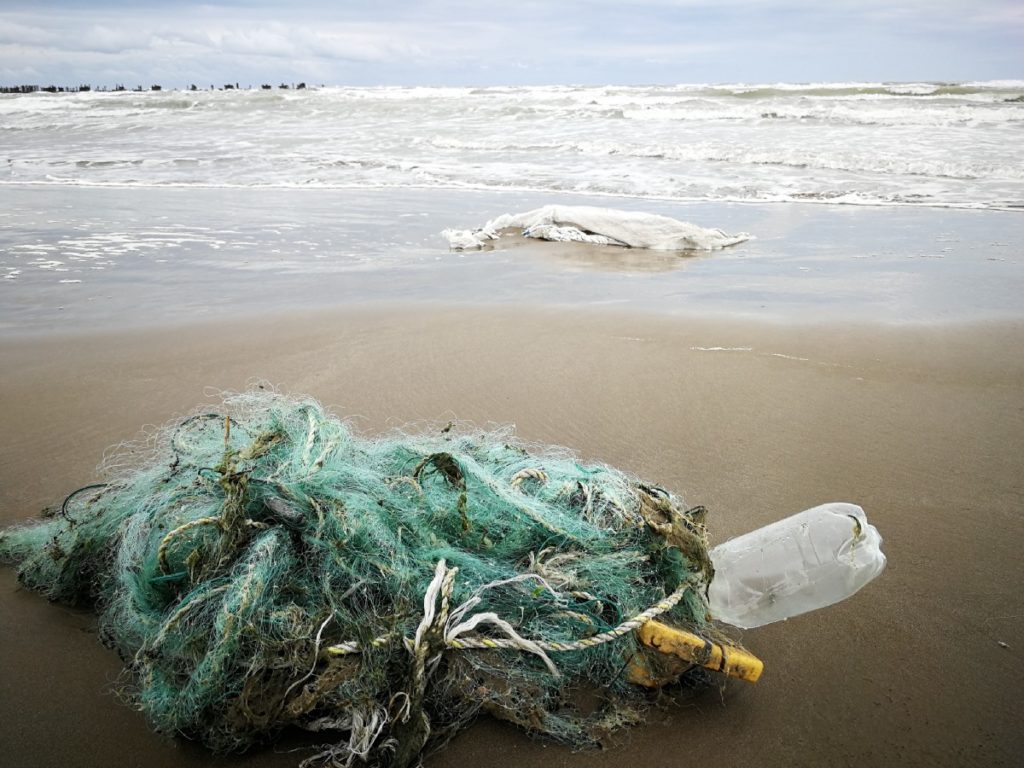
Joint Efforts of Turkmenistan
Since 1998, Turkmenistan jointly with the Caspian countries has participated in the implementation of the Caspian Environmental Programme, ratified the United Nations Framework Convention for the Protection of the Marine Environment of the Caspian Sea (Tehran), and signed a number of documents of regional significance. The state enterprise on the Caspian Sea under the President of Turkmenistan and the interdepartmental commission on the Caspian Sea together with “Turkmengidromet ” and the State Committee for Fisheries of the country ensure the safety of maritime management inside the country. “Sanitary regulations for sea vessels” and other regulatory documents were adopted. Five years ago, the country introduced the environmental insurance and implements the National Oil Spill Prevention and Response Plan.
Gurbanguly Berdimuhamedov also said that the Protocols in combating terrorism, organized crime and cooperating of Coastguards to the Agreement on Cooperation in Security Sphere in Caspian Sea would support the improvement of stability in the region. He noted that the Agreement of incident Prevention in Caspian Sea would improve the trust between the Caspian countries.
Azerbaijan: A Connecting Hub
Being regional expert on South Caucasus especially. Azerbaijan, the Caspian Sea has a great importance for signing of Caspian Sea Agreement because: connects the country with Central Asia. A lot of transit cargo traffic passes through the Caspian Sea between Azerbaijan and Kazakhstan, as well as Azerbaijan and Turkmenistan. Besides, cargoes heading from China to Europe pass through the Caspian Sea. In this regard, the interaction among the Caspian littoral states has always been at a high level, and the signing of the convention will open even greater opportunities and prospects for the development of transit cargo transportation which will boost Azerbaijan ‘s macro economy.
Azerbaijan: An Important International Transit Country
It is hoped that the signing of the convention will further strengthen the role of Azerbaijan as an international transit country and will increase its economic power. The signing of the document has created a solid legal basis for Azerbaijan: which has a wide maritime border and is actively engaged in economic activities in the Caspian Sea.
Azerbaijan’s Natural Resources
Azerbaijan ‘s proven oil reserves stood at 7 billion barrels, or 0.4 percent of the world ‘s total proven oil reserves. The country’s proven natural gas reserves are estimated at approximately 35 trillion cubic feet. Currently Azerbaijan has the most developed infrastructure in the Caspian Sea for exploration, production and transportation of oil and gas.
Greater Inflows of FDls
The convention made it possible for the country to attract more investors to participate in the development of Caspian energy resources and their delivery to the markets. Now Azerbaijan can participate in projects located in the sectors of neighboring states and invite the neighbors to participate in its own projects. It will promote the necessary legal basis for further relevant direct negotiations between Azerbaijan and Turkmenistan and Kazakhstan without the need for participation of third countries. In addition, now there is a legal basis for implementing the Trans Caspian Gas Pipeline and other projects, from which Azerbaijan will certainly benefit.
Trans-Anatolian Natural Gas Pipeline (TANAP) & Trans Adriatic Pipeline (TAP)
It is hoped that great volumes of gas in the future from Turkmenistan and Kazakhstan via the pipeline through the Caspian Sea, and these volumes will be further trans ported to Turkey and European countries via the Trans-Anatolian Natural Gas Pipeline (TANAP) and the Trans Adriatic Pipeline (TAP) will be accelerated. It will brighten economic prospects not only for Azerbaijan but also for Turkmenistan and Kazakhstan. It will lead to significant increase in all types of cargo transportation, enhance security in the region, as well as improve the ecological state of the Caspian Sea.
Regional Peace & Harmony
The Protocol on Cooperation in the Fight against Organized Crime in the Caspian Sea, the Agreement on Trade and Economic Cooperation among the Governments of the Caspian Littoral States, the Agreement on Cooperation in the Transport Sphere among the Governments of the Caspian Littoral States, the Agreement on the Prevention of Incidents in the Caspian Sea and the Protocol on Cooperation and Interaction of Border Agencies will further stimulate regional peace and harmony.
President of Kazakhstan Nursultan Nazarbayev
The President of Kazakhstan Nursultan Nazarbayev labeled the Caspian Sea Agreement as the “CONSTITUTION” of the Caspian Sea. He appreciated all the leaders who have once again reaffirmed their strong commitment to establishing a zone of peace, security, cooperation, sustainable development in this enormous region.
Remarkable Role of Kazakhstan
Kazakhstan should be proud to have hosted and participated in this historic event. The five-sided agreement has demonstrated that diplomacy remains the main vehicle to resolving disputes, irrespective of their complexities. It is hoped that this agreement will ac as motivation and give impetus to other world leaders to use diplomacy as the most effective means of resolving other outstanding global issues.
The agreement will also con tribute substantially to the development of regional cooperation in the areas of ecology, energy, transport and trade, as well as strengthen the security of the Caspian region. President Nazarbayev pro claimed: “Today, after 25 years, we can say we have made the Caspian Sea a place of cooperation in regards to its waters, soil, and aerospace.”
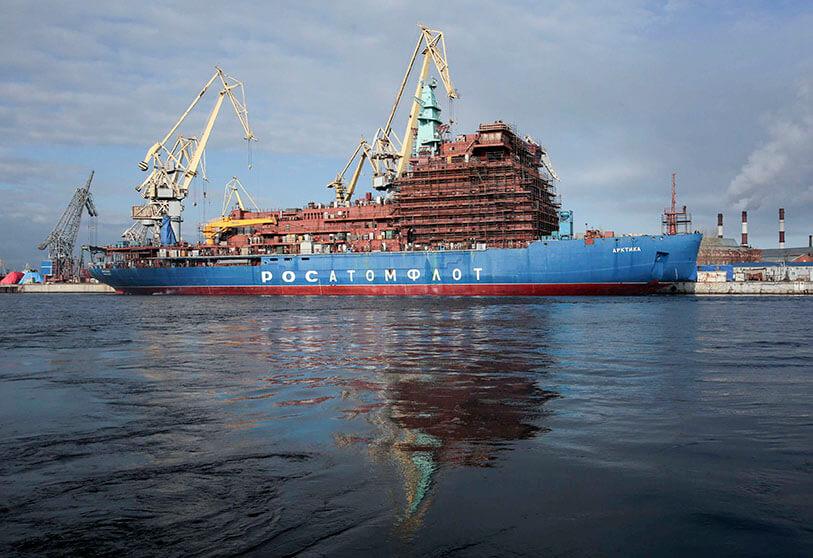
Opportunity to Transnational Companies
The adoption of the convention grants transnational companies the right to conduct activities in the Caspian Sea which will boost transit projects and attract logistics companies and new investments in the region. In this connection, Kazakhstan is already playing a key role in promoting trade and transit, especially as part of the New Silk Road project. The agreement on the Caspian Sea will provide further opportunities for Kazakhstan to contribute to the development of trade in the region and beyond, which will bring with it economic benefits.
Foreign Minister of Kazakhstan
The foreign minister of Kazakhstan stressed that the presidents of the Caspian states have truly demonstrated that on this plan et, there is a region, a zone of peace, security, mutually beneficial cooperation, sustainable development, which can serve as an example for many countries and continents.
He noted that as Central Asian countries, Kazakhstan and Turkmenistan would make a significant contribution to the cooperation between Caspian states. “If we add up the potential of Caspian and Central Asian states, we will see that we have an opportunity to become an example of good neigh burliness, friendship and mutually beneficial cooperation”.
Concluding Remarks
Convention on the legal status of the Caspian Sea was signed by President of Azerbaijan llham Aliyev, President of Kazakhstan Nursultan Nazarbayev, President of Russia Vladimir Putin, President of Iran Hassan Rouhani and President of Turkmenistan Gurbanguly Berdimuhamedov in Aktau, Kazakhstan. President of Kazakhstan Nursultan Nazarbayev played a historic role to convince all the countries to reach this historic agreement which is indeed a win-win proposition for all the five Caspian countries.
It is a strategic development which may accelerate bilateral and trilateral cooperation in the fields of economy and commerce, science and technology, agriculture, transportation via, sea, road and air, joint ventures and the last but not the least, energy cooperation within the region and beyond. Simply it is a dream come true.
During the 5th Summit, Russia, Kazakhstan, and Azerbaijan held to the principle of dividing into national sectors based on the “MEDIAN LINE” principles since it is an INTERNATIONAL BOUNDARY LAKE, and leaving the sea surface for general use i.e., they are for demarcation of mineral resources and the Caspian Sea shelf, but against dividing up its waters.
Iran, in particular, has long resisted determining the Caspian a “SEA” because Iran’s corner of the Caspian is the deepest, saltiest and least resource-rich. Iran long pushed for an equal division of the Caspian’s resources: 20 percent each of the seafloor and the surface. This was opposed by Kazakhstan, in particular, as the Kazakh corner of the Caspian has some of the richest oil and gas fields.
Iran seeks an equal division of the Caspian into five even sectors, mainly because most of the offshore energy resources are located away from the Iranian coastline. Turkmenistan also demands the division of the Sea into equal parts between the pre-Caspian countries so that each country has 20 percent of the sea. All the five Caspian Countries took a compromise approach, treating the surface as international water (i.e. a sea) and dividing the seabed into territorial zones, along the lines of a lake.
It follows more than two decades of discussions, with negotiations on the international legal status of the Caspian Sea taking place regularly since 1996. More than 50 working group meetings took place to pre pare for the convention. After numerous discussions and four previous summits at the heads of state level, the convention has been finally agreed upon.
It ends a spat over whether or not the Caspian is a sea or a lake, granting it particular authorized standing and clarifying the maritime boundaries of every surrounding nation. It additionally permits every nation to put pipelines offshore with consent solely from the neighboring states affected, relatively than from all Caspian Sea nations. The document regulates access to the sur face water and sea bed as well as various issues, including fishing, pipeline construction and environ mental concerns.
The five nations Caspian Sea agreement shows the importance of diplomacy for mutual benefit and security. It is anti-unilateralism. it promotes concept of shared socio economic prosperity and collective security parameters by respecting elements of sovereignty and dignity of others. It is victory of peaceful means over use of brutal power and sanctions. It upholds supremacy of law. It strengthens the importance of conflict resolution through diplomacy, dialogue and development.
It cares even for nature, natural resources, climate change and of course human civilization. It reflects strong political will of all the five Caspian Countries to agree on difficult equations/ propositions and they all prefer concept of accommodation and greater virtue to move forward. It is a defining moment in the ongoing, massive drive towards Eurasia integration. It will further strengthen ties of multi culturalism, and cultural diplomacy in the region.
For over 20 years, the seashore nations of Azerbaijan Iran, Kazakhstan, Turkmenistan and Russia have been locked in dispute over territorial rights governing the Caspian, the world’s largest inland body of water Russian President Vladimir Putin hailed the agreement as “epoch-making”, saying it would pave the way for greater cooperation and prosperity among the Central Asian neighbors. Iranian counterpart Hassan Rouhani tole delegates: “Our region could be an example of stability, friendship and a good neighborhood.”
The signing of Convention on the legal status of the sea, documents on cooperation in the spheres of economy, transport, ecology and biological resources in the Caspian basin strengthened security and guaranteed peace in the region it can reactivate hydrocarbon sector of the region as the projects of exploration and production increases.
With the signing of this historic Convention, a new era of large transit, transport and logistical opportunities of Azerbaijan along the North-South and East-West corridors has begun. Moreover, a new era of cooperation with neighbors was opened and facilitated. After this agreement the biggest world oil and gas companies Chevron, Exxon, Shell and BP would be able to increase the number of their projects in the region for a health competition.
Caspian Sea the world’s 11th largest drainage basin by area over 3.5 million sq. km, and holds an estimated 50 billion barrels of oil and 9 trillion cubic meters of gas in proven or probable reserves encourages all the five countries to finalize the agreement which is indeed win-win proposition for all the countries.
The Caspian region is a crucial geographical and cultural cross roads linking Europe and Asia and has proved strategically important for military and economic reasons for centuries. The convention, in particular, guarantees the absence of armed forces of non-littoral states from the region. The sea bed and subsoil are divided by neigh boring states into areas by relevant agreements and on the basis of international law.
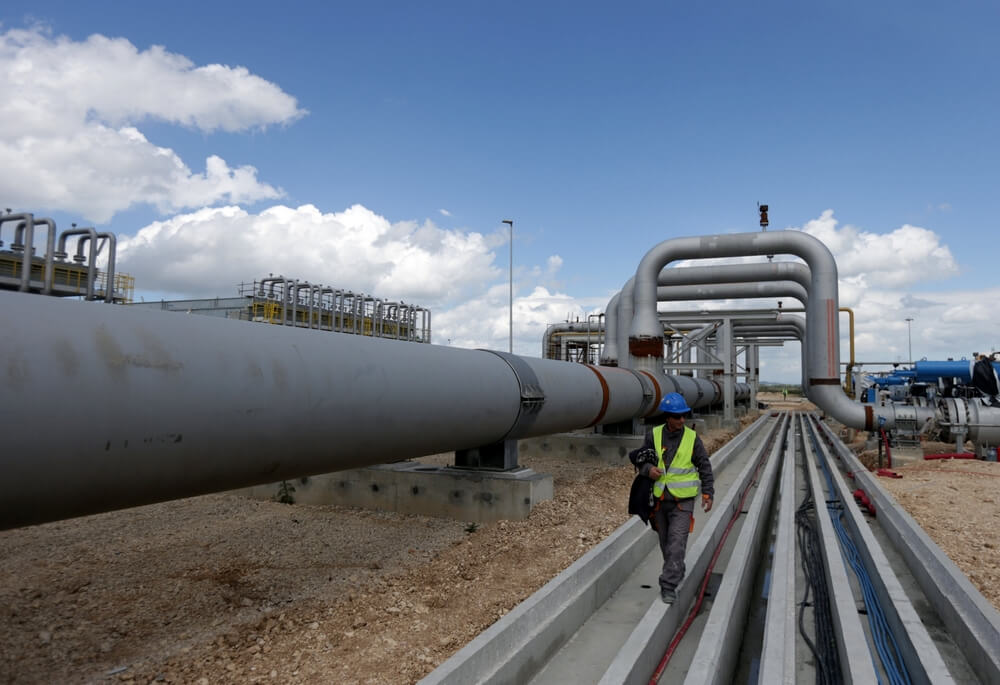
It is predicted that it will have serious economic, security and political implications for the region and beyond. It will pave the way for the construction of a Trans-Caspian Pipeline something that Turkmenistan and Europe need. It encourages pipelines of Azerbaijan, Kazakhstan and Turkmenistan. It will change the energy landscape of Europe. Turkmenistan alone has the world’s fourth-largest proven natural gas reserves. And, as technology improves, there will likely be even more resources discovered in the region. Russia and Iran have appreciated the provision of security and non-presence of any outside country in the Caspian Sea.
The Caspian region, being a powerful energy, transportation and communication hub, currently is one of the most significant geopolitical and economic centers in Eurasia and its importance has been further enhanced due to signing of Convention on the legal status of the sea. The Caspian Sea is surrounded by the five coastal countries of Azerbaijan, Iran, Kazakhstan, Russia and Turkmenistan.
It is predicted that diversified but integrated seacoast development, high growth of the oil and gas industry, regional projects for the development of the international logistics infrastructure, connecting Europe and Asia will be accelerated in the region stimulating coordinated international cooperation based on legal norms, equality and mutual consideration of interests of all Caspian littoral states. The legal status of the Caspian Sea has remained unsolved during the past two decades, preventing development and exploitation of its disputable oil and gas fields and creating obstacles to the realization of major projects.
The Caspian Sea’s disputed legal status was also a risk factor for the environment as no enforcement would have been possible to deal with a major oil spill or other pollution incident in disputed waters. In this regard, Turkmenistan, Azerbaijan and Kazakhstan have played a commendable role.
The agreement was also most needed from an ecological perspective to work together to protect the natural environment. Unfortunately, pollution has had a negative effect on the ecology of the Caspian, especially on the famous sturgeon. Now all the littoral states will be better protected from ecological disasters and potential incidents such as oil spills.
Azerbaijan, for its part, will gain huge benefits as a transit country when oil is exported from Central Asian nations via the Caspian Sea and may possibly get access to another oil block, while strengthening relations with Russia, Iran, Kazakhstan and Turkmenistan.
It is predicted that the positions of Caspian ports including Turkmenbashy port the largest and most modern port in Caspian Sea will be important transport and logistic hub of TRACECA corridor, the part of internationally recognized programme aimed at development of economic relations, trade and transport communication in Black Sea basin, Southern Caucasus and Central Asia.
Kazakhstan President Nursultan Nazarbayev termed the signing of agreement a “Constitution of Caspian” which will provide equal opportunity for all the five Caspian Countries to move forward. It is the reflection of strong political will to achieve a difficult goal. It values diplomacy over destruction, dialogue over dissident and development over disorder. It promotes concepts of positivity and meaningful engagements. It negates concept of unilateralism and imposition of sanctions. It cares about security, military compulsions and stimulates peace and harmony in the Caspian region. It loves with nature, seashores, birds, animals and sea spices which are endangered.


